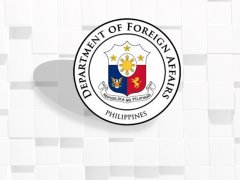
MANILA — Amid landing of Chinese aircraft in the South China Sea or West Philippine Sea, the Department of Foreign Affairs (DFA) on Monday said it is exhausting “diplomatic action” necessary whenever an activity in the contested region takes place.
“While appropriate language, whether expressions of condemnation or concern, over certain developments are clearly conveyed through diplomatic channels, it is not our policy to publicize every action taken by the Philippine Government whenever there are reported developments taking place in the West Philippine Sea and the South China Sea,” the DFA, through Acting Assistant Secretary Elmer Cato, said in a statement.
On Saturday, Beijing’s state-run paper People’s Daily bared that China has landed its bombers, including an H-6K at a “southern sea area,” reportedly in the Paracel Islands.
While not within claimed territories of the Philippines, Asia Maritime Transparency Initiative said Manila, including five Philippine military bases earmarked for development under the Philippine-United States Enhanced Defense Cooperation Agreement, fall within the radius of these bombers.
The Philippines claims parts of the South China Sea within its exclusive economic zone and calls it the West Philippine Sea.
In the statement, the DFA stressed it is in close coordination with other relevant departments and agencies and is “closely monitoring developments” in the region.
“We are taking the appropriate diplomatic action necessary to protect our claims and will continue to do so in the future,” it added. “We reiterate our commitment to protect every single inch of our territory and areas which we have sovereign rights over.”
The agency also pointed out that “the country has gained much” under the leadership of President Rodrigo R. Duterte.
“Fighting for our rights under the United Nations Convention on the Law of the Sea (UNCLOS) and under our present strategy, we intend to achieve much more, including, but not limited to, an effective comprehensive Code of Conduct that will promote peace, cooperation, and stability in the West Philippine Sea and the South China Sea,” it said.
Moving forward, the DFA reiterated it is taking a “different approach to avoid any drawbacks and challenges.”
“In professionally and prudently advancing our interests in the West Philippine Sea and the South China Sea, we will always be guided by our patriotic duty to protect the Filipino people and defend our sovereignty,” it ended.
The strategic waterway where trillion-dollar worth of trade passes annually is contested by the Philippines, China, Vietnam, Malaysia, Brunei and Taiwan. In 2017, China and the Association of Southeast Asian Nations (ASEAN) agreed to start negotiations on the Code of Conduct in the South China Sea.